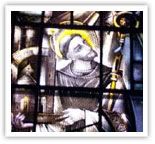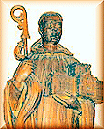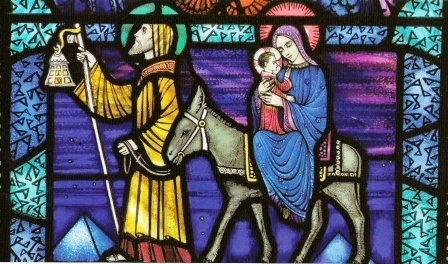----- Forwarded Message ----- ----- Forwarded Message -----
From: Trevor G. . .
To: Donald . . .
Sent: Saturday, 9 June 2012,
Subject: Re: St Robert of Newminster
Hi Father,
Thanks for the info' about Robert of Newminster.
Interesting and filled some gaps.
Do we know where his remains are?
- - -
Trust you and community are well.
Regards,
Trevor.
+ + +
Regarding the question, Trevor, I have to go back to George's book?
June 7: Saint Robert of Newminster
Posted by JacobToday, June 7, we celebrate the feast day of Saint Robert of Newminster(1100-1159), man of God, and co-founder of the Cistercian (Benedictine) Abbey at Shedale, England. While little is known about the life of Saint Robert, what is remembered is his gentle spirit, merciful judgment, and love of the Lord. His daily sacrifice and self-denial, through concern for sinfulness, remains a model of temperate living today.
Robert was born in Gargrave in Yorkshire, England. He studied for the priesthood in Paris, France, during which time he wrote a commentary on the Psalms which has unfortunately been lost to history. Upon ordination, he returned home to his place of birth, where he served as a parish priest.
After years serving as rector of Gargrave, Robert joined the Benedictine Order, having received permission from his local bishop, and working with a group of monks founded a monastery in which the strict Benedictine Rule would be revived (a movement initiated by Saint Bernard of Clairvaux, whom Robert met). For their community, they chose a beautiful spot—surrounded by natural springs-- in the valley of Sheldale (within the town of Sutton) on land given to them by the local archbishop. The monastery became known as Fountains Abbey, given the natural flowing waters mirroring the flowing of the Holy Spirit from within. The group of monks became known for their holiness, poverty, and austere way of life, with Robert recognized for his devotion and self-denial. In time, Fountains Abbey became the center of religious study in North England, and eventually affiliated with the Cistercian reform.
Given the success of Fountains Abbey, a local lord built another abbey on his land, the Abbey of Newminster. To Newminster, he brought Robert and a dozen companions. Robert was appointed Abbot, and under his leadership, the community prospered, establishing two additional abbeys in later years.
While Robert grew the religious communities at Newminster, his life was not without trials. At one point, while serving as Abbot, members of the community accused him of impropriety, suggesting that he had engaged in lascivious acts with a local pious woman. Saint Robert traveled to France, visiting Saint Bernard of Clairvaux, the head of the Order. Saint Bernard determined the accusations to be false, and as a symbol of his belief in Robert's innocence, presented him with a golden girdle to be used to affect miraculous cures of the sick at Newminster.
Robert ruled and directed the monks at Newminster for 21 years. He was a man of prayer, favored with gifts of prophecy and miracles. He is described as a devout and gentle man. While he is known for being merciful in his judgment of others, and a warm and considerate companion, he was also very zealous toward his own vows of poverty. Saint Robert is recorded as having had supernatural gifts, including visions and encounters with demons, and the gift of exorcism. In one such encounter, the Devil himself entered the church while Robert and his brothers were praying. The Devil, seeking a weak soul to tempt, was thwarted by Robert’s prayers for strength and encouragement for the monks in his charge.
Saint Robert is said to have fasted so rigorously during Lent that his brothers grew concerned, and asked him the reason for his refusal to eat. Robert responded that he might be able to eat a small piece of buttered oatcake, but once it was placed before him, fearing gluttony, he requested that it instead be given to the poor. Over the protest of his brothers, the food was taken to the front gates of the Abbey, where a beautiful stranger took both the cake and the dish it sat upon. While a brother was explaining the loss, the dish miraculously appeared on the table before the abbot, leading the men to realize that the beautiful stranger had been an angel of the Lord.
Saint Robert was close friends with the hermit Saint Godric, whom he visited frequently. On the night Robert died, Godric is said to have seen a vision of Robert's soul, like a ball of fire, being lifted by angels on a pathway of light toward the gates of Heaven. As they approached, Godric heard a voice saying, "Enter now my friends." His relics were translated to the church at Newminster. Numerous miracles have been reported at his tomb, including one in which a brother monk is said to have fallen unhurt from a ladder while whitewashing the dormitory. His tomb remains a center of pilgrimage.
The life of Saint Robert of Newminster reminds us that one does not need to live a life filled with extravagant miracles or preaching, or die a martyrs’ death to be holy. Saint Robert lived a simple life, rich in the spirit of the Lord. He gave all that he have, sacrificed, and spent his days in prayer and self-denial—oftentimes for the souls of his brothers and those who were less fortunate. Robert considered his actions carefully, always on the look-out for temptation, and wary of the pathways to sinfulness. Through fasting and prayer he converted many souls, grew the Church of God on earth, and earned himself a saint’s place in Heaven. How might we better live up to the example of this holy man?
God our loving Father, you inspired Robert
to establish a new monastery, and to preside as abbot
with gentleness and justice.
As we honor today this man of prayer, may we also learn from his example.
We ask this through our Lord Jesus Christ, your Son, who lives and reigns with you and the Holy Spirit, one God, for ever and ever. Amen.
Inspired by the origins and spiritual history of the Holy Rosary, we continue our meditation on the psalms, one each day, in order, for 150 days.
Today’s Psalm: Psalm 44: Israel’s Past Glory and Present Need
1 We have heard with our ears, O God;
our fathers have told us
what you did in their days,
in days long ago.
2 With your hand you drove out the nations
and planted our fathers;
you crushed the peoples
and made our fathers flourish.
3 It was not by their sword that they won the land,
nor did their arm bring them victory;
it was your right hand, your arm,
and the light of your face, for you loved them.
4 You are my King and my God,
who decrees victories for Jacob.
5 Through you we push back our enemies;
through your name we trample our foes.
6 I do not trust in my bow,
my sword does not bring me victory;
7 but you give us victory over our enemies,
you put our adversaries to shame.
8 In God we make our boast all day long,
and we will praise your name forever.
9 But now you have rejected and humbled us;
you no longer go out with our armies.
10 You made us retreat before the enemy,
and our adversaries have plundered us.
11 You gave us up to be devoured like sheep
and have scattered us among the nations.
12 You sold your people for a pittance,
gaining nothing from their sale.
13 You have made us a reproach to our neighbors,
the scorn and derision of those around us.
14 You have made us a byword among the nations;
the peoples shake their heads at us.
15 My disgrace is before me all day long,
and my face is covered with shame
16 at the taunts of those who reproach and revile me,
because of the enemy, who is bent on revenge.
17 All this happened to us,
though we had not forgotten you
or been false to your covenant.
18 Our hearts had not turned back;
our feet had not strayed from your path.
19 But you crushed us and made us a haunt for jackals
and covered us over with deep darkness.
20 If we had forgotten the name of our God
or spread out our hands to a foreign god,
21 would not God have discovered it,
since he knows the secrets of the heart?
22 Yet for your sake we face death all day long;
we are considered as sheep to be slaughtered.
23 Awake, O Lord! Why do you sleep?
Rouse yourself! Do not reject us forever.
24 Why do you hide your face
and forget our misery and oppression?
25 We are brought down to the dust;
our bodies cling to the ground.
26 Rise up and help us;
redeem us because of your unfailing love.
From: Donald - - -
To: George T...
Sent: Thursday, 7 June 2012
Subject: St Robert of Newminster
Dear George,
At the celebration of the Mass in honour of St. Robert of Newminster this morning we prayed for yourself and for your years and the writing and devotion to the Saint. on Newminter and the Cistercian hertiage
- - -
fr. Donald
+ + +
















